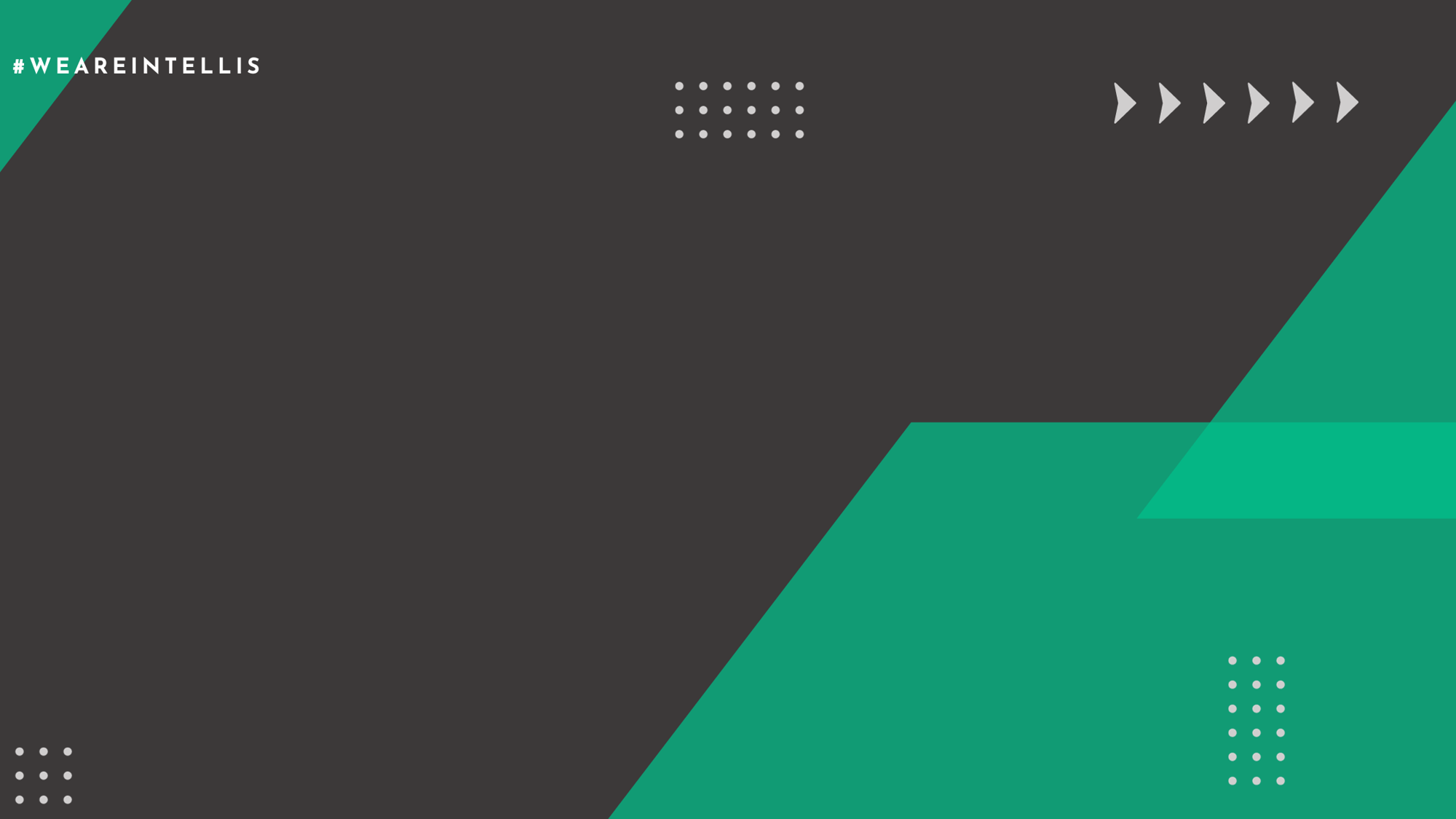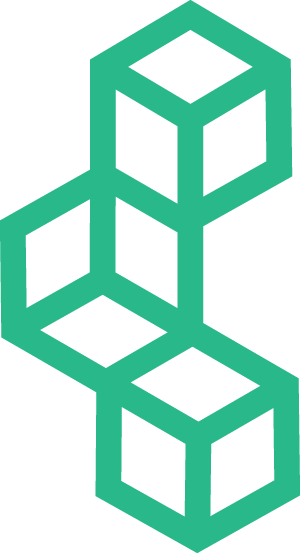How do new innovations in Information Technology (IT) impact Facilities Management (FM)? Recently, there has been a lot of buzz about Cryptocurrency, Bitcoin, and the Dark Web, but in this blog we are going to focus on Blockchain and explore the ways it could be applied to FM.
At Intellis, we believe that mastery is a moving target, which is why we are constantly evolving our products and services to better serve your organization, and our development team has its eye on this exciting new technology!
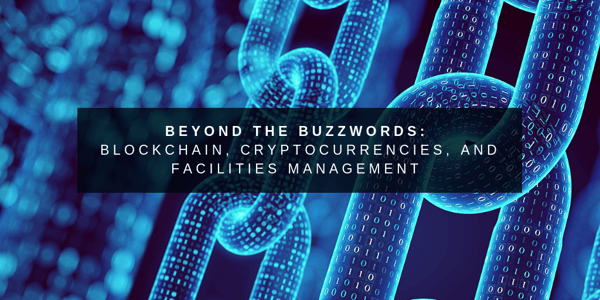
In this blog, we will:
- Breakdown the basics of Blockchain
- Examine the benefits of Blockchain for Facilities Managers
- Discuss the possible applications of this technology for FM
- How should FMs prepare for the future with Blockchain
What is Blockchain?
Blockchain is a technology that emerged in tandem with crypto-currencies. It was developed in 2008 by an entity that refers to itself as Satoshi Nakamoto. Initially, it was developed to support 'Bitcoin,' a digital currency, however, it has evolved into something more powerful.
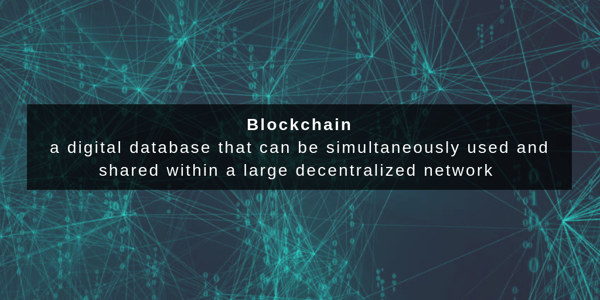
Blockchain technology is a machine-validated recording process that records all transactions using a digital ledger, which is distributed across several machines in a network. These separate transactions, blocks, are linked together with cryptographic keys. The key terms to remember are ledger and transaction. These indicate the basic functionality of Blockchain. Because Blockchain uses a distributed digital ledger across several machines, it is possible for it to be applied in any place that a ledger is used and transactions occur.
In simple terms, Blockchain is essentially a communal and shared database that does not have any central ownership. It is the shared trust element that makes it work, because the community agrees that the correct values are in the correct place, and the information is updated automatically across the network. It is possible to maintain a high level of visibility with Blockchain because, you can see everything that goes on and all parties maintain a full copy of the transactions.
Blockchain Defined
The term Blockchain first appeared in the Merriam-Webster dictionary in 2011 and is defined as follows:
Blockchain is a digital database containing information (such as records of financial transactions) that can be simultaneously used and shared within a large decentralized, publicly accessible network
Or explained more elegantly by Don and Alex Tapscott in their book Blockchain Revolution: Blockchain is "an incorruptible digital ledger, of economic transactions, that can be programmed to record not just financial transactions, but virtually everything of value."
What are Cryptocurrencies?
A cryptocurrency is a digital asset, that is a purely electronic currency that does not have any physical manifestation, which is designed to work as a medium of exchange to secure financial transactions, control the creation of additional units, and to verify that transfer of assets.
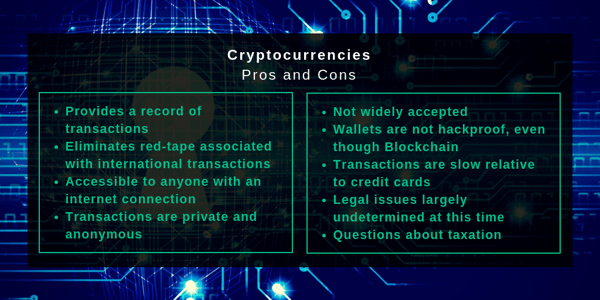
Cryptocurrencies are not affiliated with any national currency and are intended to function as an alternative currency, which employs decentralized control as opposed to centralized banking systems. This decentralized control of cryptocurrency functions through distributed ledger technology, such as Blockchain, which serves as a public financial transaction database.
In 2009, Bitcoin released is first open-source software, which is generally considered to be the first functioning decentralized cryptocurrency. Since 2009, more than 4,000 alternative variants of Bitcoin and other cryptocurrencies have been developed.
The Benefits of Blockchain for Facilities Managers
In particular, what makes Blockchain valuable for facility managers is that it offers a streamlined way to store and access secure data. Blockchain has the capability to function as a distributed, single source of shared truth. It has the potential to become the top system of record for all transactions. According to a recent article in IFMA's Facility Management Journal, if this were to happen, "the economy will undergo a radical shift as new, blockchain-based, sources of influence and control emerge. Blockchain has the potential to change the way facilities are managed, ranging from work order tracking to preventive maintenance to life cycle assessments".
The main benefit that that Blockchain offers Facilities Managers is digital trust. Blockchain functions as a cloud-based, permanent, digital ledger of activities between parties. The term cloud-based means that it does not live within your organization's private server, or any other company’s private server. The permanence of this ledger means that it exists as a permanent record of activities between parties.
For the facility management industry, this technology has applications for recording property transfers, asset digitization, HVAC system activities, tenant occupancy of cubicles, and security access. Blockchain also has the potential help manage IoT connected devices and smart buildings with renewable energy, such as solar. For example, if a facility is in a two-way energy communication with the grid, Blockchain can make it more secure and easier to develop a digital record of energy-in and energy-out transactions.
Possible Applications of Blockchain for Facilities Management
There are many potential applications of Blockchain for facility management. The main benefits are that data is secure, cannot be corrupted, and is easy to access. For the facilities management industry, Blockchain has the potential to be a valuable tool in regards to the three components of Asset Life Cycle.
- Life Cycle Assessment addresses the environmental impacts associated with every stage of a product’s useful life.
- Life Cycle Cost is the sum of all costs over the life span of a physical asset from its purchase to its installation to its disposal.
- Life Cycle Analysis determines the most cost-effective asset option among competing alternatives.
Data that is stored in a Blockchain has the potential to be quickly and easily reviewed, even when maintained by separate departments. The provides a fast and accurate data analysis. Further, highly confidential or proprietary data is far more secure because of Blockchain's single source of shared truth.
An advantage of Blockchain is that it will streamline processes and lower costs through the reduction and/or elimination of those dreaded manual operations. This could be adapted to almost any process including preventive maintenance, work orders, environmental health and safety planning, and space management.
Blockchain could also positively impact the Internet of Things. IoT is the network of physical objects embedded with electronics, software sensors, and network connectivity that enables these objects to collect and exchange data, more simply put, it refers to connecting things (machinery, sensors) to the internet.
Read our guide to the top trends that are changing the facilities management industry today >
While IoT is a powerful tool, all of these sensors that continually collect and store data in the cloud is primed to create a security issue. This creates opportunities for theft, break-ins and other security risks. Therefore, storing this information using Blockchain would ensure that this data is far more secure.
How to Prepare for the Future with Blockchain
While the widespread implementation of Blockchain is still a long way off, it is still a good idea to invest time and energy into evaluating and researching the ways in which this exciting new technology could be implemented. At Intellis, we believe that it is never too early to start identifying areas that can be improved by new developments in technology.
Of course it is important to maintain perspective when it comes to implementing emerging technologies, however, mastery is a moving target. While Blockchain may be challenging to adopt, it has profound potential to positively benefit the future of facility management operations. The time to prepare is now!
Want to learn more?
{{cta('b630756b-30eb-4178-9af9-a77c333f8174','justifycenter')}}
Research and Further Reading
Chenoweth, Hannah, "How will Blockchain Impact Healthcare Facilities Management," HealthSpaces, https://info.healthspacesevent.com/blog/how-will-the-blockchain-impact-healthcare-facilities.
Chohan, Usman, "Cryptocurrencies: A Brief Thematic Review," University of New South Wales (UNSW), UNSW Business School; Critical Blockchain Research Initiative (CBRI), https://papers.ssrn.com/sol3/papers.cfm?abstract_id=3024330.
Conley, Bill and Charlene Richards, "The Past and Future of Blockchain in FM," IMFA Publication, http://fmj.ifma.org/publication/?i=483818&article_id=3041474&view=articleBrowser&ver=html5#{%22issue_id%22:483818,%22view%22:%22articleBrowser%22,%22article_id%22:%223041474%22}.
Greenberg, Andy, "Cryptocurrency," Forbes Magazine, https://www.forbes.com/forbes/2011/0509/technology-psilocybin-bitcoins-gavin-andresen-crypto-currency.html#5ca5c7d1353e.
Janus, Kevin, Erik Jaspers, Dave Karpook, and Ted Ritter, IFMA's World Workplace Planery Session (2018), "Blockchain for RE & FM Is this for real yet?," https://events.ifma.org/worldworkplace/2018/profile.cfm?profile_name=session&master_key=5835C55D-F0AF-6D57-2056-218B4BFE6D41&xdetail&xtemplate.
May, Michael and Geoff Williams (Eds), The Facility Manager's Guide to Information Technology, International Facility Management Association, https://www.amazon.com/dp/1938780000/ref=cm_sw_su_dp.
Merriam-Webster Dictionary, Blockchain, https://www.merriam-webster.com/dictionary/blockchain.
Saleem, Osman, "Uses of Blockchain in Facility Management," A New Deal for Buildings blog, https://newdeal.blog/uses-of-blockchain-in-facility-management-53e3f76d62ca.
Stanley, Lisa, "Preparing For A Blockchain Ecosystem In FM," Facilities Executive, https://facilityexecutive.com/2017/11/preparing-for-a-blockchain-ecosystem-in-fm/.
Tapscott, Alex and Don Tapscott, Blockchain Revolution, http://blockchain-revolution.com/.
Zimmerman, Greg, "Blockchain and FM: What you Need to Know," Building Operating Management magazine, https://www.facilitiesnet.com/facilitiesmanagement/tip/Blockchain-and-FM-What-You-Need-To-Know--41529.
